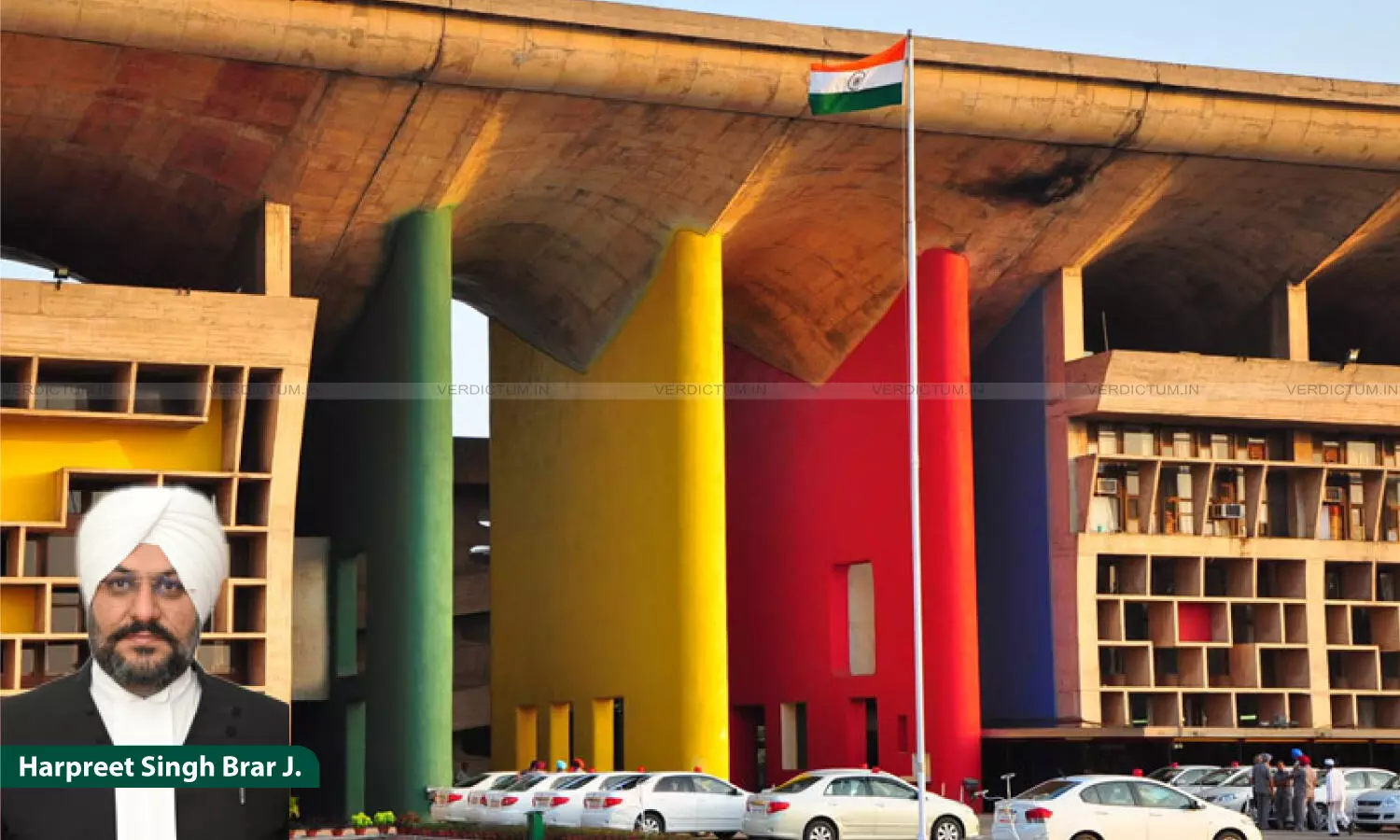
Justice Harpreet Singh Brar, Punjab & Haryana High Court
Can’t Deny Bail To Accused In Complaint U/S.132 Of CGST Act Solely Because Of Pendency Of Investigation Against Co-Accused: Punjab & Haryana High Court
 |
|The Petition before the Punjab & Haryana High Court was filed for the grant of regular bail in a case registered under Section 132(1)(b) of the Central Goods and Services Tax Act, 2017.
The Punjab and Haryana High Court has held that an accused in a complaint under Section 132 of the CGT Act cannot be denied the concession of bail, solely on the ground that investigation remains pending against a co-accused. The High Court also observed that slow-paced trials stemming from complaints under Section 132 throughout the States of Punjab, Haryana, as well as the Union Territory of Chandigarh, are symptomatic of a systemic problem.
The Petition before the High Court was filed under Section 483 of Bharatiya Nagarik Suraksha Sanhita, 2023, seeking regular bail in a case stemming from a complaint filed under Sections 132(1)(b) of the Central Goods and Service Tax Act, 2017 (CGST Act) and punishable under Section 132(1)(b) and 132(1)(c) of the same.
The Single Bench of Justice Harpreet Singh Brar held, “In view of the discussion above, this Court has no hesitation in holding that an accused in a complaint under Section 132 of the CGT Act cannot be denied the concession of bail, solely on the ground that investigation remains pending qua a co-accused. Furthermore, learned counsel for the respondent could not controvert the fact that the petitioners have clean antecedents and have fully cooperated in the investigation. Moreover, most of the evidence is in documentary and electronic form, which is already in possession of the investigating agency.”
Senior Advocate Vinod Ghai represented the Petitioner, while Senior Panel Counsel Sharmila Sharma represented the Respondent.
Factual Background
The Financial Investigation Unit in the form of a Suspicious Transaction Report(STR) had received information indicating substantial cash withdrawals to the tune of Rs. 4,938.63 crore, from two branches of the IFSC Bank- Ambala Cantt and Panchkula. It was further revealed that petitioner Amit Kumar Goyal withdrew Rs 262.4 crore in cash from 8 bank accounts while his brother, petitioner Manish Kumar, withdrew Rs 455.02 crore from 11 bank accounts. The petitioners had also created 27 fake firms.
A search was conducted under Section 67(2) of the CGST Act at four locations and several documents about fake GST billing, as well as various electronic devices, were recovered. On investigation, it was concluded that the petitioners issued forged and fabricated GST invoices worth approximately Rs 700 crore.
Reasoning
The Bench explained that the CGST Act provides for a departmental tax liability assessment under Sections 73 and 74 as well as for criminal prosecution for tax evasion under Section 132. While the former calls for the imposition of a penalty in the event of any wrongdoing, the latter provides for a sentence of imprisonment up to 5 years.
The Bench observed, “While this Court is not oblivious to the gravity of economic offences and its impact, of late, it has been observed that the involvement of the criminal justice system in cases pertaining to the CGST Act seemingly begins at the stage of arrest and ends when a bail is secured. Allowing such tendencies to go unchecked would raise serious doubts about the efficacy of investigation, which naturally weakens the faith of the public in the justice dispensation mechanism. Moreover, this Court is of the considered opinion that the slowpaced trials stemming from complaints under Section 132 of the CGST Act and the departure from the established procedure qua Section 73 and 74 of the CGST Act, throughout the States of Punjab, Haryana as well as Union Territory of Chandigarh is symptomatic of a systemic problem. As such, it would be against the interest of justice to shield the prosecuting agencies from accountability with regard to timely conclusion of trials.”
The Bench found that the respondent was carrying out abrupt arrests, driven by some inexplicable urgency rather than necessity, and the data suggested that the respondent did not pursue the trial with the same urgency. It was further highlighted that curtailment of personal liberty to some extent, during the judicial process, cannot be avoided. However, if the period of deprivation pending trial becomes excessively long, the fairness as guaranteed under Article 21 of the Constitution of India would come into play.
The Bench noticed that the petitioners had been in custody for 9 months 18 days while no substantial progress had been made in the trial. On the issue of bail, the Bench stated that while the possibility of evidence tampering had been flagged, the entire case was based on documentary and electronic evidence, which were already available with the investigating agency, and all of the prosecution witnesses were officials of the respondent. “As such, there is no scope of tampering with the evidence or influencing the witnesses. In that vein, this Court finds it against objective standards of reason and justice to deny bail to those accused against whom final report has been presented merely on the ground that the investigation is under progress qua a co-accused”, it held.
Thus, allowing the Petitions, the Bench released both the petitioners on regular bail, subject to their furnishing bail bonds/surety bonds to the satisfaction of the concerned Court.
Cause Title: Manish Kumar v. Directorate General, Goods & Service Tax Intelligence, Zonal Unit, Ludhiana (Neutral Citation: 2025:PHHC:097148)
Appearance
Petitioner: Senior Advocate Vinod Ghai, Advocates Kashish Sahnia, Arnav Ghai, Muskaan Gupta, Muskan Chauhan
Respondent: Senior Panel Counsel Sharmila Sharma, Senior Standing Counsel Sunish Bindlish, Senior Standing Counsel Pridhi Sandhu, Public Prosecutor Manish Bansal, Addl. P.P Alankrit Bharadwaj